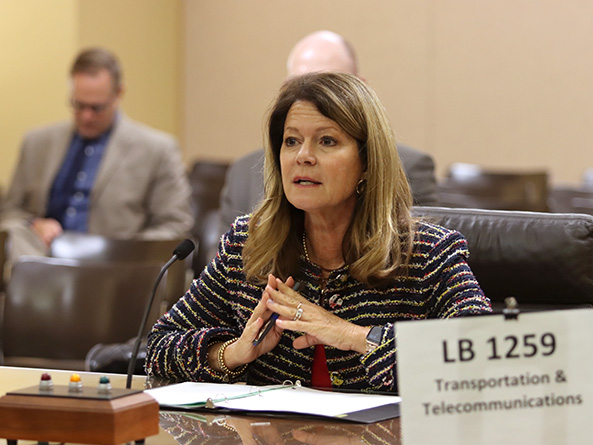License plate fees, issuance cycle discussed
A bill heard by the Transportation and Telecommunications Committee Feb. 1 would increase the cap on license plate fees and extend the length of license plate issuance cycles in Nebraska.

LB1259, introduced by Lincoln Sen. Suzanne Geist on behalf of the state Department of Motor Vehicles, would allow the DMV to charge a license plate fee of up to $5. The fee currently is capped at $3.50. The bill also would change the plate issuance cycle from 6 years to 10 years starting with new plate issuance in 2023.
Geist said that LB1259 would help the Nebraska Department of Correctional Services recover from the rising cost of license plate production.
DMV director Rhonda Lahm testified in support of LB1259, saying the current plate fee of $3.30 has not changed in 18 years.
“[The NDCS] has experienced an increased cost for materials and for production which make them unable to continue producing the plate at the current maximum fee,” Lahm said. “Extending the cycle of plate issuance to 10 years will result in a lower per-year cost for the plate.”
Also testifying in support of the bill was Scott Frakes, director of NDCS. Cornhusker State Industries provides work and educational training to nearly 500 incarcerated men and women, he said, which includes the manufacturing of Nebraska license plates. The increased cost of metals and the need for modernized equipment is contributing to increased production costs, he said.
“When reviewing pricing for the 2023 license plate reissue cycle, CSI determined that [the] statutory limit … would not be sufficient to cover projected expenses,” Frakes said.
In opposition to LB1259 was Jon Cannon, executive director of the Nebraska Association of County Officials. He expressed concern that a license plate’s durability would not hold up for 10 years.
“Materials that we use in our license plates are reaching the end of life after five or six years,” Cannon said. “[That’s] a concern for our law enforcement because they need to be able to visually see and inspect license plates when they’re pulling someone over.”
The committee took no immediate action on LB1259.


